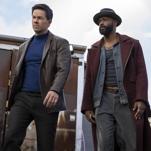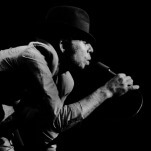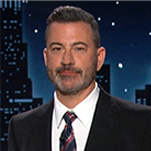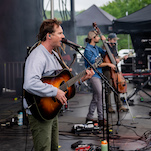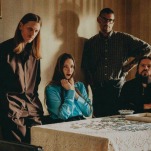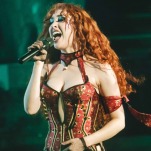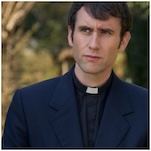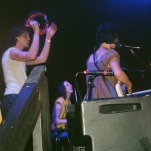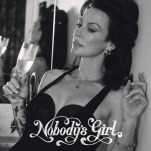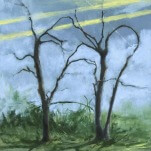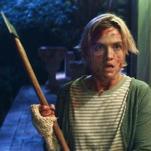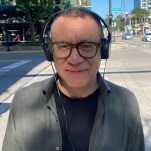A Budapest Full of Magic and Horror Comes to Life in This Exclusive Excerpt from This Rebel Heart
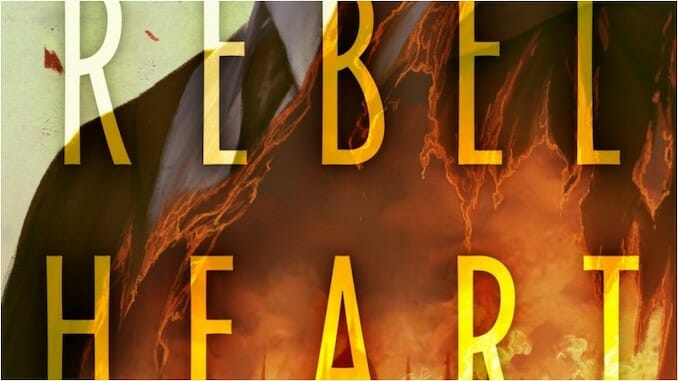
Katherine Locke’s novel This Rebel Heart is many things. A historical tale set against the backdrop of the Hungarian Revolution, it is also a story full of magical realism, deep emotion, and questions of belonging.
Eleven years after the Holocaust and a decade after the Russian conquest, Jewish Csilla lives in a Budapest gone literally colorless and controlled by the secret police. But as she questions whether to flee her complicated homeland for the safety of a new life in Israel or stay and join the revolution to try and save it, she’ll have to confront her complicated feelings about what the idea of home even means.
Here’s how the publisher describes the story.
In the middle of Budapest, there is a river. Csilla knows the river is magic. During WWII, the river kept her family safe when they needed it most—safe from the Holocaust. But that was before the Communists seized power. Before her parents were murdered by the Soviet police. Before Csilla knew things about her father’s legacy that she wishes she could forget.
Now Csilla keeps her head down, planning her escape from this country that has never loved her the way she loves it. But her carefully laid plans fall to pieces when her parents are unexpectedly, publicly exonerated. As the protests in other countries spur talk of a larger revolution in Hungary, Csilla must decide if she believes in the promise and magic of her deeply flawed country enough to risk her life to help save it, or if she should let it burn to the ground.
This Rebel Heart will arrive on shelves on April 5, and we’ve not only got an exclusive excerpt from the novel to share, it comes complete with a special introduction from Katherine Locke herself. Keep reading to learn more about the trip to Budapest that helped Locke crystallize her view of the story she was writing, and watch as a stranger helps Cscilla narrowly escape a run-in with the secret police.
![]()
An introduction from Katherine Locke:
I don’t get to travel for book research often. It’s often cost-prohibitive, and in the last two years obviously I’ve not traveled much beyond Philadelphia. But I began writing This Rebel Heart in 2017, and in 2018, I traveled to Budapest with my dad in the dead of February to do book research. It was fun traveling solo with my dad for the first time since I was eight years old. And if you can believe it, flights to Budapest in the middle of February were cheap. Turns out not many people pick Eastern Europe as a vacation spot in winter.
I’m glad I went to Budapest though because there’s something inherently, distinctly magical about that city. And there’s an essence I hope I captured in This Rebel Heart. We walked the path from the Technical Institute along the river to Bem tér, the square where students gathered to protest in October of 1956. And then we walked across the Margaret Bridge to Parliament to stand in a square that still memorializes the revolution, when civilians were shot and killed outside their own government building asking for reforms, freedoms, and the end to Russian occupation.
 We visited museums and synagogues. We ate salted meats and cabbage. We found a ruin bar—a unique phenomenon in which bars sprung up in the ruins of buildings that’d long collapsed from war or lack of care and funds during Communist years. We found farmers’ markets and parks and bookstores. We found a city still warring with its own history, grabbling with its complicity with Nazi Germany, with the horrific trauma enacted on Hungarian Jews, and then the aftermath: everything that happened in the Communist regimes after Russia occupied it. And still, while navigating the tenuous line between remembering and memorializing, turning something from a galvanizing moment into a nationalist movement, there’s a city split by a river, full of art and joy and hope.
We visited museums and synagogues. We ate salted meats and cabbage. We found a ruin bar—a unique phenomenon in which bars sprung up in the ruins of buildings that’d long collapsed from war or lack of care and funds during Communist years. We found farmers’ markets and parks and bookstores. We found a city still warring with its own history, grabbling with its complicity with Nazi Germany, with the horrific trauma enacted on Hungarian Jews, and then the aftermath: everything that happened in the Communist regimes after Russia occupied it. And still, while navigating the tenuous line between remembering and memorializing, turning something from a galvanizing moment into a nationalist movement, there’s a city split by a river, full of art and joy and hope.
Budapest was a reminder to me that cities can grapple with history and look forward at the same time, and that individual people can do that even when their governments do not. When we were on a tour of the Dohany Street Synagogue, our tour guide said, “Hungary chose the wrong side in both World Wars, but we are trying to choose the right side now.”
I carried that with me into this book. In This Rebel Heart, I wanted to write a book I thought would resonate for readers of this time: people who acknowledge the mistakes and missteps and atrocities in the past without downplaying them, and while always making room for each other, work together to find a better future. We may not see that future in our lifetimes, but that doesn’t mean we don’t work for it.
![]()
An excerpt from Chapter 2 of This Rebel Heart
Chapter Two
Csilla
October 17, 1956
He was still following her.
In her mind, she could hear her mother say, Breathe in peace and exhale unrest. She used to tell Csilla and Simon that every Shabbat, before she struck a match and lit the candles.
She couldn’t think of anything other than that somehow the ÁVH had found out about her and Ilona’s plans to flee Hungary. She didn’t know how, but that was the only possibility.
Still, she knew as well as the next person that they didn’t need reasons. They might not know, and they might disappear her anyway.
To her left, the river whispered to her incessantly, like a heart murmur she could hear in her own ears. Something tugged at her, like the river was reaching for her, and she could not ignore it. And she thought, if it came to it, she could jump into the river. Again.
She turned left, toward the river, past homes that had been bombed out or were still abandoned, their residents never coming home, and past houses that had once belonged to Jewish friends of hers but were now occupied by gentile Hungarians who had stood by when their neighbors were taken for the slaughter.
And all at once, the buildings ended and the Duna glittered in front of her in the early morning light. The sight of the river nearly erased all the frenetic, desperate thoughts in her head.
The river sighed softly when she came into view.
She did not know if a river could miss a person, but if any river could, it would be this one.
This morning, the river appeared almost shadowed, a shade ever so slightly darker than silver. Pewter, Csilla thought. The color of a blade.
The world tilted, wobbling on that edge.
What else was a lie?
She’d seen the river glinting like this before. To escape the Nazis, when deportation finally came for the Hungarian Jews in May 1944, her father had jumped, dragging her mother and Csilla with him, from the Chain Bridge and into the silver river. She was six, and she still wore her hair in two pigtail braids tied off with ribbons that might have been as pink as a sunrise. When she saw the river, she could still remember the scream ripped from her chest on plummeting into the cold, cold water.
But the memory did not scare her. The man still behind her did.
She crossed the tram tracks and walked along the banks. She could see in the shadows on the silver river that the man, the secret police, had caught up with her. He was only a few paces behind her. The river hissed in her mind, and she felt the sound splinter across her ribs.
Her tongue was stuck to the roof of her mouth.
I’m so close, she thought again, dizzy. We’re so close.
She’d done everything right. She had. She’d thought that her parents’ exoneration would lift the cloud of suspicion that had hung over her for the last four years, provide the opening she needed to escape. But instead, here they were, the day after the funeral.
She could leap into the river if she wanted to. If she needed to. It’d save her again. Maybe it was a sign that it was the same shade of silver as that day. Maybe it wanted her to jump in. Maybe it knew she’d need to leap.
But if she jumped, she and Ilona would never leave Hungary. And if he disappeared her, she and Ilona would never leave Hungary.
He was only a few paces behind her. No one else seemed to notice.
There was a car idling up on the road that ran along the river. She couldn’t watch the car and watch the man’s shadow on the river at the same time.
Her pulse pounded in her fingertips. The blood rushed out of her head to her belly, pooling.
She needed to cut back into the city. They could find her anywhere, but she might have a better chance of shaking him for now if she could get back into the city. Then she could make a plan. She couldn’t plan now, with him this close behind her. The only choice she had here was the river.
“Csilla!” called a voice.
She flinched instinctively, but the voice wasn’t coming from behind her. A young man with moppish hair and long, gangly limbs waved to her as he jumped down the small wall and strode toward her, an easy smile on his face and a casual gracefulness to his walk.
“Csilla,” he said warmly, even though she did not recognize him.
Secret police, she thought desperately.
But she was frozen.
All this time surviving, all this survival she’d already done, and it’d be a waste because she couldn’t make herself move. She couldn’t make herself go into the river or scream or run away.
The new young man took her hands in his, squeezing them. He kissed both of her cheeks, and on the second cheek he whispered, “Play along. I can help you.”
And then his lips grazed her cheek again.
She breathed in steadiness. She exhaled unrest.
She lifted her face to him, forcing lightness into her voice. “I’m sorry I’m late! I overslept.”
He slipped her hand into the crook of his elbow and began walking her away from the secret police behind her. “It happens. You needed the rest. Good work comes from good rest.”
In the shadows on the silver river, the secret policeman was falling behind her. She exhaled.
The stranger squeezed her hand a bit and whispered, “You must continue talking.”
She swallowed and raised her voice. “You’re right, I know you’re right. I’m sorry, comrade.”
There was no reason to trust this man. He might be secret police too, leading her to the car or to somewhere else she didn’t want to be. But she had the choice of the river, the man behind her, and the man who sounded reassuring. Something in her tugged her forward with the stranger.
She listened to the river. It wasn’t hissing as it’d done for the secret policeman. Its murmurs were warm and soothing.
The stranger raised his voice, telling her some story about his parents and their adventures to acquire a bottle of pálinka the night before and his little brother’s ruined school uniform. He was filling the space, she thought, and she wasn’t sure how much of this was true, but he was a gallant speaker. The more she listened to him, though, his Hungarian wasn’t quite right. He said her name in a slightly drawn-out way, chee-lah, like he was lingering over the first syllable, while everyone else she knew said it like a bite. His Hungarian was too perfect, lacking any dialect, any accent.
It’s learned, not native, she realized.
He could be secret police. Or he could be a spy, and she could be in more trouble than she thought.
But if he was a spy, he wasn’t trying to lead her astray. He started to slow down, and she realized, dizzy with relief, that he’d led her to the steps of the newspaper. They stopped there and didn’t continue across the street.
The newspaper building was drab and uninteresting, flat-faced and droll like all the postwar buildings. And right across the street was 60 Stalin Street, the headquarters of the ÁVH, the security forces of Hungary, her father’s former place of work and the place where both of her parents died.
Her father’s hands had shaped this country, its brilliance and its evils.
And this country’s hands had shaped him, his brilliance and his evils.
And those hands still worked and shaped and killed in that building.
“Csilla,” said the stranger, pulling her gaze back to him. He was so close to her, still strangely charming and beautiful, his cheekbones chiseled in his face and his eyes bright beneath his moppish hair. He looked familiar, but she couldn’t place him.
If she hadn’t been watching him so carefully, she would have missed the way his eyes slid off hers for just a heartbeat, noting the secret policeman behind her.
“Still there,” he murmured, his lips not moving. Then he smiled, and she knew it was a smile for the policeman’s sake, but she wished he was smiling like that at her. It made her want to smile back.
“I’ll pick you up after work,” he told her loudly. “ We’ll talk more then. Promise.”
She frowned at him, and his eyes pleaded with hers. He wanted to talk to her—about what? Who he was? Another secret-police tail? She didn’t know if she could take the risk—but he’d saved her from throwing herself into the river or being dis- appeared this morning.
She felt like she owed him.
“If you insist,” she said, trying to make her voice sound playful. But she hadn’t any practice, and it came out high-pitched and squeaky, like she was panicked.
He didn’t seem to mind or notice. He kissed her cheeks again. This time he whispered, “Walk in with someone. Be safe. See you later.”
And he let go of her hands. He gave her an encouraging smile, and with great effort, though he was still a complete stranger to her, she stepped away from him. She turned, scanning the other people heading into work, hoping to see one of her friends. But most of the faces were unfamiliar, and she could not risk the unfamiliar.
She caught sight of someone whose name she knew, even if she didn’t know him very well, and she called out to him, “Comrade Szendrey!”
This Rebel Heart will be released on April 5, 2022, and you can pre-order it here.
Lacy Baugher Milas is the Books Editor at Paste Magazine, but loves nerding out about all sorts of pop culture. You can find her on Twitter @LacyMB.





